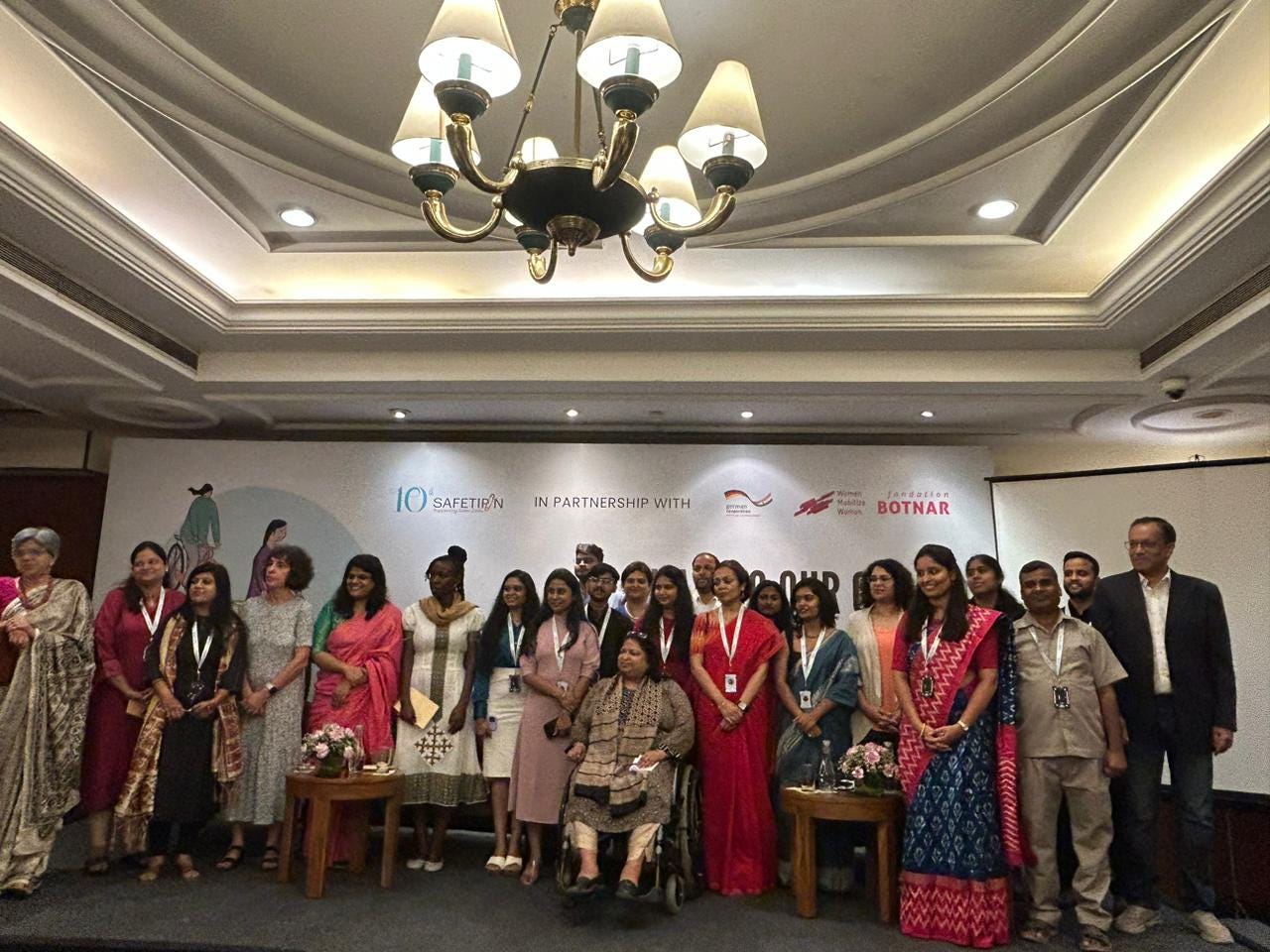Thursday evening. A well-frequented conferencing venue in New Delhi, India. It is nearing the end of a day full of charged and highly informative deliberations on how gender-sensitive technologies and data practices can transform urban policy and practice. Then, two unusual things happen.
A flamboyant facilitator from Johannesburg uses evocative storytelling to dissolve the boundaries between expert and audience, Asian and African, women and men, by getting all participants to move, dance, wave and cluster together on the stage. Then, a well-loved Indian activist inspires the group to burst into a spontaneous song - “Hum honge kamyaab ek din…(we will succeed, someday…)”.
Such embodied ways of being together have been the hallmark of women’s movements worldwide. Their use in this event was no coincidence but a reminder of the DNA of the organisation whose tenth anniversary we had come together to celebrate.
Safetipin, a tech company working to make cities safe for women, combined the sensibilities of its founders - Kalpana Vishwanath, who brought in decades of experience in gender activism and policy advocacy, and Ashish Basu, who brought in the tech talent and foresight. Safetipin’s unique contribution has been to use technology to democratise the practice of conducting safety audits of urban public spaces, thereby generating valuable data for designing meaningful changes, both at pragmatic and policy levels. At a time when conventional data collection practices through periodic representative surveys are on the wane, either because of cost or perceived lack of credibility, user-generated data like this is rapidly bridging this gap. It’s not the tech itself but its use as a lever to bring a complex and much-avoided subject like gender to the centre of policy discussions that is Safetipin’s stellar achievement.
From what I understand, the Safetipin app, based on a safety audit tool, has helped generate spatial data to help cities target infrastructure investments (e.g. ensuring dark spots have street lights) and helped communities provide evidence when they made demands from the government. Safetipin’s expanded focus on empowering and involving youth in data-informed collaborative urban design and activism is particularly hopeful, as it recognises the broader impacts of patriarchy on society and pursues bottom-up pathways for transformation. The impressive uptake of the Safetipin App in 75 cities across 16 countries offers the organisation a vantage point to view issues of gender and safety in the context of global urbanisation.
When we were being instructed to move and dance, and make )literal) waves!
The concluding panel with all Safetipin team members sharing the stage!
Representatives from organisations in India and abroad who spoke at the anniversary event provided many examples of how the work of creating gender-sensitive public spaces and social change is happening simultaneously at the community scale, in neighbourhoods, schools, and workplaces, as well as at the policy level by feeding into laws, standards and government programmes. Sohini Bhattacharya of Breakthrough spoke about how a ‘deep transformation’ programme with 11-25 yr olds in rural India has reached over 700,000 adolescents and 3000 adults driven by a gender equity curriculum and subsequent youth leadership opportunities. Safetipin’s Cities for Youth project trains youth from tier-2 cities like Jaipur and Ajmer in Rajasthan to collect data and creates opportunities to engage with other urban stakeholders and policymakers. Anjlee Agarwal from Samarthyam spoke about how persistent advocacy has helped improve accessibility in public transport across cities through changes in bus design and policies. Naomi Mwaura from FLONE Initiative spoke about how skill building in driving and financial management has helped women increase their participation in Kenya’s informal transport sector. Beyond this, initiatives to address women’s care burdens and the gender-based violence they face are also now part of the policy conversation.
It is obvious that combining the objectivity of technology-enabled data and the ethical and moral grounding of gender activism is emerging as a powerful strategy to achieve transformation while adhering to the principles of justice, equity and democracy that have been at the heart of the global gender movement over decades. However, participative and bottom-up initiatives also raise ethical challenges and broader questions. As Anshul Tewari of Youth ki Awaz, a youth-drive digital media platform, reminded us, the youth (and women in many instances) empowered by programmatic interventions face a societal backlash as their views are often considered inconvenient. Much work remains, therefore, to shift fundamental questions about gender and youth in society. But as nearly every speaker at the event reiterated, bringing hard and irrefutable data to the table helps take us much further down the route of policy change and is a useful complement to the rich lessons we learn from narratives, stories and songs that have been the preferred data language of feminist researchers.
Finally, a word on the power of sustenance and the slowness of change. Policy conversations tend to have a hamster-on-the-wheel feel. We hear the same conversations for years, and it all feels a bit tired. From the tone and tenor of the conversations, it seemed like this was not the case in the context of gender and public space. Many participants, including Safetipin co-founder Kalpana Vishwanath, in her closing comments, pointed out that gender was now an integral part of most policy conversations. The good news is that the fight is no longer so much about including a gender lens, but much more about building the consensus to implement suitable and sustainable solutions. Changing mindsets is a slow process, and it is no mean feat for an organisation in this challenging space of gender and urbanisation. So kudos to Safetipin!
Next week, I spotlight another stellar organisation, which has experimented boldly in fostering societal communication in my city, is led by the most amazing and able women, and is going strong after 14 years!





